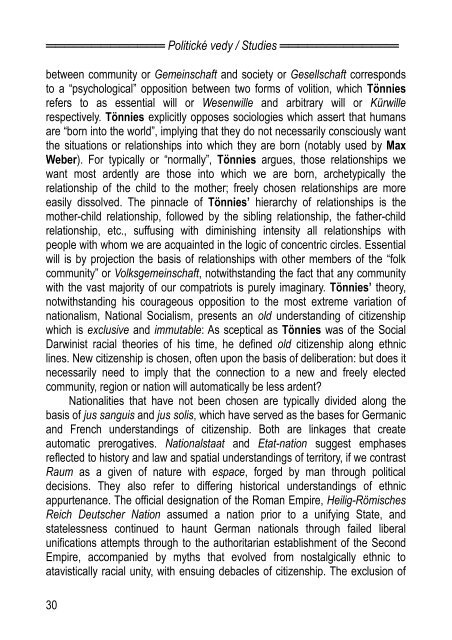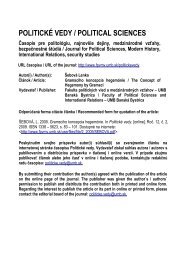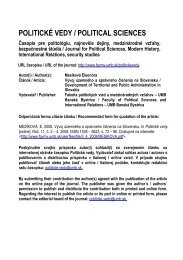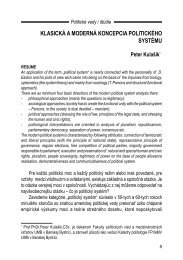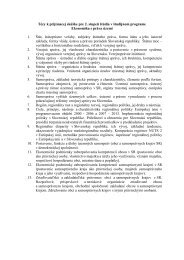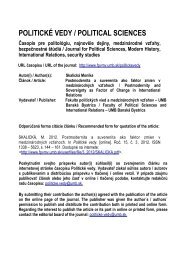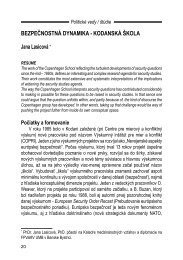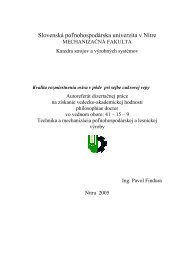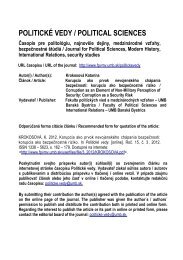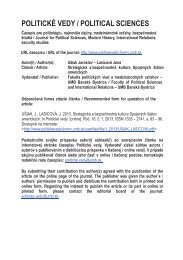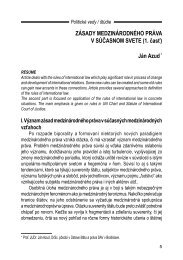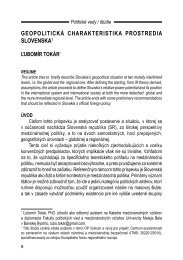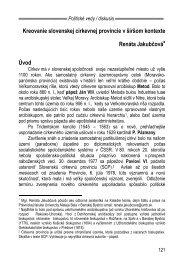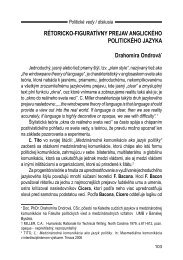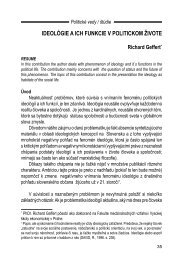Citizenship in Community and Society: Ferdinand ... - Politické vedy
Citizenship in Community and Society: Ferdinand ... - Politické vedy
Citizenship in Community and Society: Ferdinand ... - Politické vedy
Create successful ePaper yourself
Turn your PDF publications into a flip-book with our unique Google optimized e-Paper software.
═════════════ Politické <strong>vedy</strong> / Studies ═════════════<br />
between community or Geme<strong>in</strong>schaft <strong>and</strong> society or Gesellschaft corresponds<br />
to a “psychological” opposition between two forms of volition, which Tönnies<br />
refers to as essential will or Wesenwille <strong>and</strong> arbitrary will or Kürwille<br />
respectively. Tönnies explicitly opposes sociologies which assert that humans<br />
are “born <strong>in</strong>to the world”, imply<strong>in</strong>g that they do not necessarily consciously want<br />
the situations or relationships <strong>in</strong>to which they are born (notably used by Max<br />
Weber). For typically or “normally”, Tönnies argues, those relationships we<br />
want most ardently are those <strong>in</strong>to which we are born, archetypically the<br />
relationship of the child to the mother; freely chosen relationships are more<br />
easily dissolved. The p<strong>in</strong>nacle of Tönnies’ hierarchy of relationships is the<br />
mother-child relationship, followed by the sibl<strong>in</strong>g relationship, the father-child<br />
relationship, etc., suffus<strong>in</strong>g with dim<strong>in</strong>ish<strong>in</strong>g <strong>in</strong>tensity all relationships with<br />
people with whom we are acqua<strong>in</strong>ted <strong>in</strong> the logic of concentric circles. Essential<br />
will is by projection the basis of relationships with other members of the “folk<br />
community” or Volksgeme<strong>in</strong>schaft, notwithst<strong>and</strong><strong>in</strong>g the fact that any community<br />
with the vast majority of our compatriots is purely imag<strong>in</strong>ary. Tönnies’ theory,<br />
notwithst<strong>and</strong><strong>in</strong>g his courageous opposition to the most extreme variation of<br />
nationalism, National Socialism, presents an old underst<strong>and</strong><strong>in</strong>g of citizenship<br />
which is exclusive <strong>and</strong> immutable: As sceptical as Tönnies was of the Social<br />
Darw<strong>in</strong>ist racial theories of his time, he def<strong>in</strong>ed old citizenship along ethnic<br />
l<strong>in</strong>es. New citizenship is chosen, often upon the basis of deliberation: but does it<br />
necessarily need to imply that the connection to a new <strong>and</strong> freely elected<br />
community, region or nation will automatically be less ardent<br />
Nationalities that have not been chosen are typically divided along the<br />
basis of jus sanguis <strong>and</strong> jus solis, which have served as the bases for Germanic<br />
<strong>and</strong> French underst<strong>and</strong><strong>in</strong>gs of citizenship. Both are l<strong>in</strong>kages that create<br />
automatic prerogatives. Nationalstaat <strong>and</strong> Etat-nation suggest emphases<br />
reflected to history <strong>and</strong> law <strong>and</strong> spatial underst<strong>and</strong><strong>in</strong>gs of territory, if we contrast<br />
Raum as a given of nature with espace, forged by man through political<br />
decisions. They also refer to differ<strong>in</strong>g historical underst<strong>and</strong><strong>in</strong>gs of ethnic<br />
appurtenance. The official designation of the Roman Empire, Heilig-Römisches<br />
Reich Deutscher Nation assumed a nation prior to a unify<strong>in</strong>g State, <strong>and</strong><br />
statelessness cont<strong>in</strong>ued to haunt German nationals through failed liberal<br />
unifications attempts through to the authoritarian establishment of the Second<br />
Empire, accompanied by myths that evolved from nostalgically ethnic to<br />
atavistically racial unity, with ensu<strong>in</strong>g debacles of citizenship. The exclusion of<br />
30


